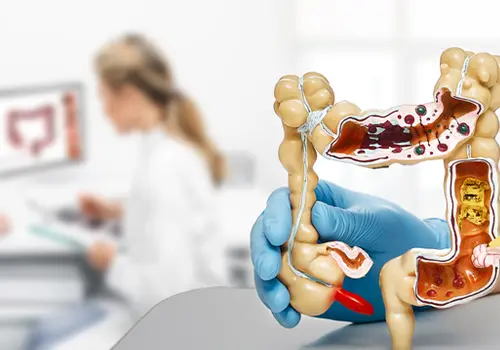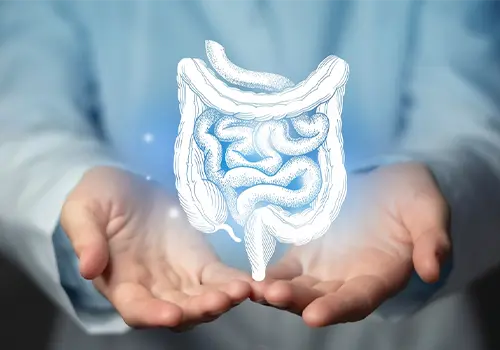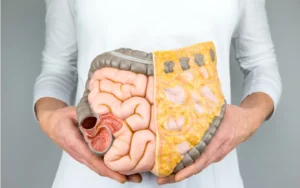what is Colon Cancer?
The human digestive system includes the colon, which plays a crucial role in absorbing and digesting food. To gain a deeper understanding of this process, it is necessary to delineate the path food takes from consumption to elimination.
After entering the mouth, food is partially cooked by the teeth and mixed with saliva before proceeding to the esophagus. From there, the esophageal muscles guide the food to the stomach, where stomach acid and enzymes break it down into small particles.
The next destination is the small intestine, where vital nutrients and vitamins are absorbed into the bloodstream, and any remaining substances move on to the large intestine. In the large intestine, water present in foods and beverages is absorbed, and the remaining material is transported to the rectum, where it is stored until excretion. Colon cancer originates from abnormal cell proliferation in the colon.
Small Bowel Cancer
Small bowel cancer is a rare malignancy that seldom arises from the uncontrolled growth of malignant cells in the small intestine. The small intestine, which connects the stomach to the large intestine, is the primary site for the absorption of nutrients, vitamins, and salts.
The development of cancerous cells can lead to obstruction in the small bowel over a period of time. There are various types of small bowel cancer:
- Carcinoid Tumors:
These tumors are a type of neuroendocrine tumor found in the small intestine’s enterochromaffin-like cells and tend to grow slowly.
- Adenocarcinoma:
Adenocarcinoma begins in the glandular cells lining the small intestine and is the most common type of small bowel cancer. Most of these tumors develop in the part of the small intestine near the stomach and can grow to block the intestine.
- Sarcoma:
A tumor forms in the muscle tissue of the small intestine.
- Stromal Tumor:
A stromal tumor is a type of gastrointestinal stromal tumor that arises in the cells present in the walls of the digestive system.
- Lymphoma:
Lymphomas are malignancies that originate from lymphocytes, which are immune cells. Individuals with these cancers often exhibit weakened immune systems due to immune system disorders, leading to resistance against infections and diseases. Lymphoma can develop in various body regions, including the small bowel.

Causes of Small Bowel Cancer
The occurrence and spread of this disease can be attributed to an unsustainable and erroneous lifestyle. This includes the consumption of high-fat foods and tobacco products. Additionally, there are other significant factors that deserve attention.
These include a family history of gastrointestinal disorders, chronic inflammatory bowel diseases such as Crohn’s and celiac disease, autoimmune diseases, or a compromised immune system due to aging. All of these elements contribute to an increased risk of developing small bowel cancer.
Symptoms of Small Bowel Cancer
Small bowel cancer, like many other types of cancer, does not have specific early symptoms. However, over time, the disease’s symptoms begin to manifest in a distinct pattern:
- Abdominal pain
- The presence of a lump in the abdomen
- Nausea, vomiting, and diarrhea
- Unexplained weight loss
- Anemia
- Presence of blood in the stool
Methods of Diagnosing Small Bowel Cancer
The above-mentioned symptoms alone are usually insufficient to confirm whether an individual has small bowel carcinoma or an alternative condition. If there is suspicion of growth, it is essential to undergo medical assessments and evaluations to confirm the diagnosis.
- Medical History and Physical Examination:
The consultation with a physician begins by considering the patient’s medical history and inquiring about symptoms or potential risk factors, along with an assessment of any pre-existing medical conditions within the family. Subsequently, a physical examination is conducted by the physician, with special attention to any signs of swelling or bowel sounds, as they attempt to identify any obstructions.
- Blood Tests:
Comprehensive blood analysis, known as a Complete Blood Count (CBC), is utilized to evaluate levels of red blood cells, white blood cells, and platelets. The occurrence of small bowel cancer can induce internal bleeding, resulting in a decrease in red blood cell count or anemia. Furthermore, chemical blood tests are performed to identify signs that cancer has spread to the liver or to detect any other underlying complications.
- Imaging Tests:
These tests are conducted to diagnose tumors and assess the extent of cancer. Types of these tests include:
- MRI, which uses radio waves to provide precise images of various body tissues.
- CT scan, which utilizes X-rays to offer detailed images of different body tissues.
- Barium X-ray imaging involves introducing a barium-containing substance to the patient’s anatomy via the mouth or nose, followed by X-ray imaging.

The physician determines which of these three techniques should be used based on the patient’s diagnosis. These techniques may involve the use of barium solutions, barium given through a thin tube inserted through the patient’s mouth or nose, or barium enemas introduced through the patient’s rectum.
- Endoscopy:
An endoscope is a narrow, flexible tube equipped with a light source and an optical device. It is inserted through the mouth to allow the physician to view clear and well-defined visual displays of the person’s internal gastrointestinal areas.
- Biopsy:
A biopsy, also known as a tissue sample, involves extracting a portion of an abnormal area and transferring the sample to a laboratory for comprehensive analysis.
Treatment Methods for Small Bowel Cancer
- Surgery:
Surgical intervention is the predominant therapeutic approach used to manage this specific malignancy. Surgical procedures may involve the removal of malignant tissue or the creation of a bypass for the intestine, as deemed appropriate by the physician. In cases where a bowel tumor is obstructing and cannot be removed, the physician may consider creating an alternative route for intestinal contents to bypass the tumor.
- Chemotherapy:
Chemotherapy involves the use of medicinal agents to eradicate cancer cells. These drugs are typically administered through intravenous injection or orally and can effectively penetrate the bloodstream, allowing access to cancer cells throughout the body.
- Radiation Therapy:
The use of high-energy rays as a means to eradicate or inhibit the proliferation of cancer cells is a discussed approach.
Colon Cancer, also known as Colorectal Cancer
The colon comprises various anatomical sections, including the cecum, colon, and rectum. Colon cancer is a disease stemming from the abnormal proliferation of cells in this region. Polyps, which are benign clusters that develop in the inner lining of the colon, often indicate the early stages of the disease. Depending on the exact location of cancerous growth, it may be classified as colon cancer or rectal cancer.
Causes of Colon Cancer
Factors that increase the risk of developing colon cancer are largely elusive, much like those that lead to small bowel cancer. Additionally, a medical history including colon polyps and diabetes may contribute to the development of this disease.

Symptoms of Colon Cancer
- Changes in bowel habits such as diarrhea, constipation, or alterations in stool consistency.
- Rectal bleeding or the presence of blood in the stool.
- Abdominal issues like cramping, bloating, or pain.
- A feeling of incomplete bowel evacuation.
- Fatigue or weakness.
- Unexplained weight loss.
Stages of Colon Cancer
Identifying the stages of disease development is a crucial step in devising the most effective treatment plan. This disease manifests in various stages, with early stages characterized by cancer cells confined to the mucosa or inner lining of the colon or rectum. Conversely, advanced stages are identified by the spread and extension of cancer cells to other organs in the body.
Methods for the Detection of Colorectal Cancer
- Physical Examination and Medical History
- Blood Tests
- Stool Test
- Colonoscopy
Colonoscopy involves the use of a slender, flexible, and illuminated tube equipped with a small camera. The physician introduces the colonoscope through the rectum into the large intestine to thoroughly examine the colon and rectum. Biopsies may be taken if necessary.
- Proctoscopy
This method closely resembles colonoscopy but is specifically used to examine the rectum and rectal area.
- CT Colonography (Virtual Colonoscopy)
CT colonography is a diagnostic test that uses CT scans to examine the large intestine. It is sometimes referred to as virtual colonoscopy.
- Biopsy or Tissue Sampling
- Ultrasound (Sonography)
Common Treatment Methods for Colorectal Cancer
- Surgical Intervention
The choice of surgical removal and eradication of malignant tissue depends on the disease’s progression rate and is performed through various methods based on the physician’s diagnosis. In some cases, laparoscopic polypectomy is performed, while in others, a portion or the entire large intestine may need to be removed (total colectomy), and a colostomy device is used to collect feces.
- Chemotherapy
Prescribing anti-cancer drugs orally or intravenously to eliminate malignant cells is an appropriate treatment method. This method may also be employed after surgery.

- Radiation Therapy
Radiation therapy is an effective treatment method that can be used independently or in combination with other forms of treatment such as chemotherapy and surgical intervention. It utilizes gamma or X-rays, as well as particle accelerators, to target and eradicate malignant cells within the body.
- Immunotherapy
An examined therapeutic approach focuses on drug-based methods aimed at harnessing the innate immune system’s abilities to combat the presence and proliferation of cancer cells in the body.
The Last words
Our comprehensive guide illuminates the intricacies of colorectal cancer, providing invaluable insights into its causes, symptoms, and diverse treatment options. Take charge of your well-being by proactively engaging in a consultation that tailors medical expertise to your unique needs.
The journey to colorectal health begins with understanding, and Dr. Maadico is here to guide you every step of the way. This personalized consultation goes beyond information—it’s an opportunity to discuss your concerns, ask questions, and gain a deeper understanding of your individual health profile. schedule your consultation with Dr. Maadico today.
Get a Free Consultation
Top of Form
FAQs
1.How can one prevent colorectal cancer?
- Maintaining a balanced body weight and preventing overweight.
- Consuming foods rich in fiber, vegetables, and fruits.
- Engaging in daily physical activity.
- Avoiding tobacco and smoking.
- Refraining from processed meat products.
- Avoiding stress-inducing factors that weaken the immune system.
- For individuals of older age, and as advised by a physician, undergoing screening tests such as colonoscopy is essential.
2.Is colorectal cancer hereditary?
out of every three individuals diagnosed with colorectal cancer, one of them has relatives who have had colorectal cancer.
Individuals with a first-degree family member (parents, siblings, or children) with a history of colorectal cancer are at a higher risk of developing colorectal cancer.
3.What is the role of nutrition in the development of colorectal cancer?
Nutrition plays a significant role in the prevention, treatment, and recovery from colorectal cancer. Probiotic-rich foods like yogurt, kefir, and foods high in fiber such as fruits and vegetables play a crucial role in this regard.
Additionally, the consumption of processed foods, especially processed red meat, and foods containing preservatives can increase the risk of colorectal cancer.
4.Does alcohol consumption, smoking, or addiction play a role in the development of colorectal cancer?
Yes, the use of drugs, tobacco, and excessive alcohol consumption are factors that increase the risk of developing colorectal cancer.
5.What is the duration of hospitalization for colorectal cancer surgery?
The duration of hospitalization for colorectal cancer surgery varies depending on the type and extent of the procedure. In most cases, patients will need to stay in the hospital for approximately 3 to 4 days. However, if a complete colectomy is performed and the entire large intestine is removed, the hospital stay may extend to up to 2 weeks.
6.What does postoperative care after colorectal cancer surgery include?
- Avoid lifting heavy objects for 4 to 6 weeks after surgery.
- Avoid excessive straining during bowel movements.
- Take your medications as prescribed by your doctor.
- Resume normal activities such as work, light physical activity, driving, walking, and sexual activity only as directed by your physician.
- Do not expose the surgical area to water until your doctor gives permission.
- Adjust your diet according to your doctor’s instructions. You may be asked to follow a low-residue diet for one week.



